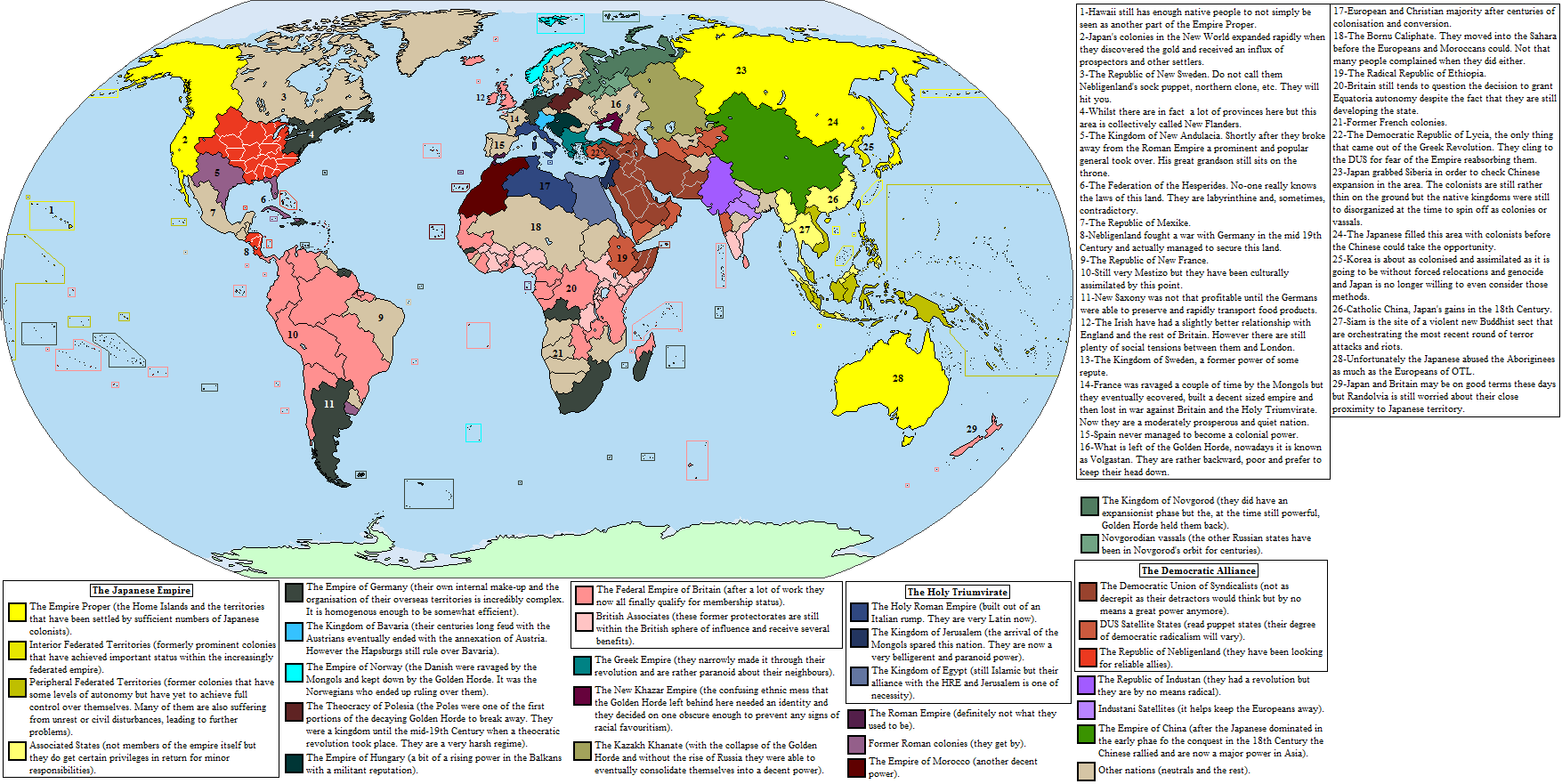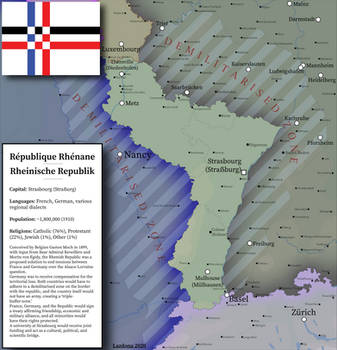Deviation Actions
Description
A Rampages Consequences:
A request by EmperorSimeon based on the map provided here. In this world the Mongol Empire had a slightly different formation and was able to rampage through Europe and Northern India. Despite the difficult terrain the Mongol Hordes crushed every resistance that stood in their way and cut a swathe of destruction through Continental Europe. Annexing the territory they overran into their immense empire.
However the Mongol Empire ended up being even more overstretched than OTL and now had to deal with the addition of millions of volatile Christians. Like OTL the Mongol Empire ended up being divided into several khanates and the Golden Horde received their territories in Europe. Europe, having suffered a serious blow and with countless thousands displaced by the ravaging Mongol Hordes also began to change. From this chaos some very strange changes took place that would change forever.
Though they teetered on the brink of annihilation, surprisingly, the Byzantine Empire were one of the nations that prospered from the destruction that had been visited on most of Christendom. Though they were, at one point, overrun by the Serbians, Bulgarians, Vlachians and others fleeing the Mongols the Byzantines were able to assimilate them and use their new population boost to reinvigorate their empire. Under a series of incredibly successful emperors and with their rivals either broken or distracted the Byzantines were able to build an empire that stretched across much of the Mediterranean, from Antioch to Lisbon. The decay of the Rhomaion Empire began with their civil war that saw the empire split in two when their Italian territories rebelled and two separate dynasties claimed the divided halves for themselves. For a time there was a Rhomaion Empire in Spain and a Greek Empire in Greece and Anatolia. Eventually the Rhomaion Empire disappeared, consigned to history forever as a nation that took one final chance for power and slowly crumbled away.
Elsewhere things developed. The Mongol Empire shattered irreparably and slowly disappeared as their remnants were overthrown or overrun. China once again regained control of it's lands and completely removed it's Mongol rulers. The Golden Horde was dismantled piece by piece as Christian rebels slaughtered or converted them. The Ilkhanate of West Asia was assimilated slowly and became the last portion of the Mongol Empire to finally fall.
With Spain broken by the Byzantines and the Rhomaion occupied with their wars with the Greeks it was the English who accidentally discovered the Americas (here known as the Ruperttias). A colonial era would take place as nations sought extra resources and saw enterprise in both the New World and the emerging overseas routes to Asia. A Renaissance, begun by the Byzantines due to their access to art and learning from Rome and Cordoba, would take place and lead up to an ATL Enlightenment and an Industrial Revolution centuries later.
One of the reigning superpowers of 2014 is the Empire of Japan. European traders and missionaries succeeded in opening up Japan much earlier than OTL and gave them a chance to modernise (by the standards of the time). The adoption of European ideas, especially those surrounding crusading, led to a much earlier expansion. By 2014 the Japanese Empire is Catholic, even though their form is rather unorthodox. However the empire has become increasingly liberal. Certain traditional values surrounding family and social standing are still very common but the empire has been slowly transforming itself into a more decentralised and post-racial system for decades.
The Japanese still have issues with allowing foreigners to settle on the Home Islands but the relaxation of border controls in their colonies is finally allowing immigration and cultural exchanges to take place. Conversion missions are no longer explicitly enforced by the government but do still take place, mostly from private organisations and conservative political parties. Thankfully such endeavours are not forcible anymore. Continued violence in parts of the Japanese Empire are endangering the liberalisation process with many seeing these actions on the part of the local populace as reasons why the colonies should not be permitted self-governance or why borders should be more strictly policed.
Europe eventually recovered from the collapse of the Golden Horde. Mongol rule was always very weak in areas like the Alps and it was here that a core of traditional European culture and traditions survived. It was this region along with other areas that had suffered as many attacks that recovered first.
The German Empire is a nation that was created from the German cultural rump in the Alps. After successfully spreading back into the lands that had recently been conquered from the decaying Golden Horde the Alpine Germans set about building a new empire of their own. One of the nations born from this expansion slowly developed into a modern state with a constitutional monarchy. The loss of the Netherlands and the Hanseatic League damaged any previous German maritime traditions and had to essentially be relearned. Germany is fully modernised, having imported foreign expertise as well as innovating existing technology at the time. Germany is more well known for high culture and is the new centre of European art, music and drama. This began with the Rhomaion occupation of Italy when scholars fled North into the Alpine regions, bringing Classical art, philosophy and architectural techniques with them. A consequence of their slow liberalisation and adoption of a constitutional monarchy was the federalisation of the nation, allowing various minor nationalities and identities to have autonomy within the empire itself.
The Roman Empire survives by the skin of it's teeth. The Roman Empire is a fragment of it's former self holding the Straits of Gibraltar and a bit of Southern Iberia but little else. Their small colonial empire, built back when they had enough strength remaining to do so at the command of some of their more monomaniacal emperors, has slipped from their control or been conquered by enemies and rivals. Except for running a cautious business levying small tolls on shipping into the Mediterranean the Roman Empire is a husk of a great nation, fumbling it's way through the 21st Century.
The British Isles received a lot of refugees when the Mongols ravaged the European Continent and with the destruction of the Netherlands and other trading states in the North Sea the English became the premier maritime state in Northern Europe. England would go on to unite the British Isles in what would become known as the Britannic Empire. Scottish fishermen would eventually discover the Americas, prompting the English to explore further whilst the rest of Europe was distracted by it's own affairs. England, later Britain, succeeded in capitalising on the wealthiest portions of the New World and built a mighty colonial empire.
The British Empire is one of the major superpowers alongside, and often in partnership with, Japan. However it is a rather corpulent entity and had to undergo a series of very drastic reforms to hold itself together. In order to maintain coherency the British were forced to decentralise their empire a process that has been ongoing for nearly a century and is still being refined. The monarchy' status has also changed over time from absolutist, to enlightened despot to something approaching a constitutional monarch. A massive central parliament and bureaucracy handles the administration of the empire as a whole whilst regional parliaments in all the constituent states of the empire manage regional affairs and answer to the central parliament in a federated system. Britain still nominally considers itself a member of the Catholic Church but they mostly only follow the Pope's spiritual leadership and tends to disregard any attempts at exercising Papal authority in secular matters. Religious tolerance is a rather new idea in the British Empire and for much of it's history it did attempt to forcibly convert it's imperial subjects. However the public practice of other faiths is now allowed and missions are strictly performed by private organisations and initiatives without the direct assistance of the state.
The Fatamid Caliphate survived the destruction caused by the Mongols and even recovered, filling the vacuum left by the decline of the Ilkhanate. The Fatamids were able to build a new empire that dominated the Mediterranean and Middle East for a few centuries before beginning to decline. In the 19th Century a particularly incompetent caliph started a war with the, at the time, resurgent Kingdom of Jerusalem and the Holy Roman Empire. Their defeat exacerbated the social unrest the Caliphate was experiencing.
The Democratic Union of Syndicates is a sort of socialist state. Every component state of the DUS is autonomous but at the same time they are all subservient to the immensely powerful central government in Baghdad. The ruling Party constantly compete or infiltrate as many institutions as possible with the military as the closest thing to a rival in government. The ideology that dominates the DUS is totalitarian and supports utopianism in order to legitimise their decisions. Every constituent of the DUS have socialised economies and highly regulated societies that are constantly watched by a highly powerful secret police force and surveillance system. Religion is illegal, the result of various religious based rebellions against the new government.
The DUS was able to build a small alliance of radical states that emerged in the wake of their own revolution. These allies vary in their support of radical ideologies. The DUS' grip over these satellites has varied over the years and is currently rather tenuous.
Germany's largest colony in the Ruppertias forcibly broke away with them in the 19th Century after they achieved a certain size and strength. The Union of Nebligenland stood the test of time, despite several failed attempts to conquer the surviving German colonies to their north. Though they failed to oust the Japanese off of the West Coast or conquer the former Roman colonies to their south they did expand into the Great Plains and secure their new territories. They are an aristocratic republic with a fairly decentralised system and a capitalist economy with very few regulations, most of which concern the environment and property rights. Though Christian, the Nebligenlanders are staunchly anti-Catholic which has made them wary of the major powers. Their alliance with the DUS is rather recent and one made during a period of tense relations with the Japanese and British.
Technology is at about the same level as OTL. However modern technological development is more widespread and more of the world is industrialised. Recent advances in communication technology have allowed an internet equivalent to be developed though it has not yet reached the DUS' sphere of influence. The greater extension of industrialisation has depleted fossil fuel reserves more than OTL and the global search for alternative fuel sources is much more well funded and encouraged. The use of nuclear power is more widespread though a few disasters have reduced the formerly rapid construction of new reactors to accommodate energy demands. Pollution is also an issue, especially in densely populated areas like the British and Japanese islands and the Mediterranean. Modern medicine is another field getting a lot of attention as new diseases and antibiotic resistant strains of bacteria develop and spread. This world did have a Space Race of it's own, though this one was based more on nationalism than an ideological basis. Despite the expense the hypothetical benefits of space are considered worth investing towards in a world that is beginning to suffer from resource shortages.

































